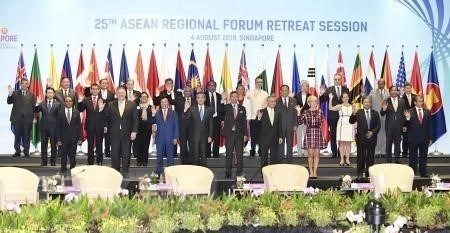The participants came from 10 member countries of the Association of Southeast Asian Nations (ASEAN), 10 dialogue partners (Australia, Canada, China, the EU, India, Japan, New Zealand, the Republic of Korea, Russia, and the US), along with Papua New Guinea, the Democratic People’s Republic of Korea, Mongolia, Pakistan, Timor-Leste, Bangladesh and Sri Lanka.
Deputy Prime Minister cum Foreign Minister Pham Binh Minh led the Vietnamese delegation to the event.
The ministers shared the view that after 25 years of development, the ARF has continued to affirm its role as one of the key forums for dialogue and cooperation in politics-security, building trust, and implementing preventive diplomacy in the region.
They noted that the ARF needs to persist in the agreed basic principles, including decision making by consensus, moving at a pace comfortable to all members and respecting the ASEAN’s central role. The ARF members should continue carrying out trust building measures in tandem with preventive diplomacy while fully and effectively realizing the Hanoi Plan of Action to Implement the ARF Vision Statement 2020 through practical activities to effectively cope with security challenges which are becoming more and more complex in the region.
    |
 |
|
The 25th ASEAN Regional Forum in Singapore |
Additionally, the ARF should enhance coordination with other security-defense cooperation frameworks and mechanisms of the ASEAN and the region, and maintain relations with research agencies to make use of their consultancy.
At the forum, the ministers agreed to adopt the ARF statement on disaster relief cooperation, the list of the ARF’s activities in 2018 and 2019, and the ARF’s work plans on maritime security and disaster relief in 2018-2020.
Discussing the regional and global situation, they underscored the importance of a rule-based international order and the role of multilateral organisations, considering these as pillars of international peace, stability and development.
The ministers welcomed the recent progress in regional issues and called on relevant parties to fully and seriously implement the reached agreements to ensure sustainable peace and stability on the Korean Peninsula.
The ministers also voiced concerns about emerging security challenges, including terrorism, trans-national crimes, marine security, cybersecurity, and natural disasters. They agreed to strengthen cooperation within the framework of the ARF and other regional mechanisms to better cope with these challenges.
Regarding the East Sea issue, the ministers reaffirmed the significance of maintaining and promoting peace, security, stability, and freedom of navigation and aviation in the East Sea.
Many of them voiced concerns over activities which have eroded trust, including militarization, increased tension and may undermine peace, security, and stability in the region. Thus, the ministers laid stress on the restraint and settlement of disputes based on international laws and the United Nations Convention on the Law of the Sea 1982 (UNCLOS) as well as respect of the diplomatic progress and legal procedures.
They said that concerned parties must not use or threaten to use force, and not carry out militarization activities, while fully and effectively implementing the Declaration on the Conduct of Parties in the East Sea (DOC), towards reaching an effective Code of Conduct in the East Sea.
At the event, Deputy Prime Minister Pham Binh Minh lauded the ARF’s role and contributions in the past time, including the promotion of dialogues, and cooperation to build trust and respond to security challenges.
He recommended the ARF to continue focusing on effectively implementing the Hanoi Plan of Action and other agreed plans. More reforms in the ARF’s operations are needed to respond to regional and global changes, Minh said.
Expressing his concern over the activities which escalate tension in the East Sea, erode trust and undermine regional and global peace, Minh said that the involved parties must not have actions that further complicate the situation and tackle the disputes by peaceful measures based on international laws and the UNCLOS 1982.
Also, he informed Vietnam’s initiatives to host an ARF workshop on enhancing cooperation among law enforcement forces at sea, and another seminar on applying the UNCLOS 1982 and international legal tools to cope with marine challenges.
Source: VNA